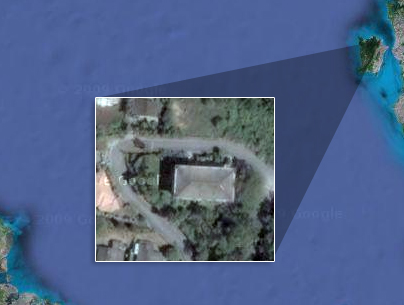Last week’s episode of the Spark podcast featured author Cyrus Farivar, who spoke about the concept of “cultural laziness,” which manifested itself to him while he was living in France, but because of the wonders of modern technology, was able to be culturally living in America. As he described this concept, I realized that I had experienced the very same thing while living in Malaysia. Let me explain:

From 2005 through 2006, I lived on the island of Penang, in Malaysia (Pictured to the left: The island of Penang is slightly of the coast of mainland Malaysia on the upper right. The inset image is a zoomed satellite image of the home I lived in. On the left is the edge of Sumatra). I was actually still working for Newfangled at the time, and within a day or so of moving in to our home, had a strong internet connection set up and running. Because of that, I was able to use Skype, in addition to email and instant messaging, to communicate with friends, coworkers and clients for very little cost. I was also able to stream radio from the United States, including my favorite NPR program On Point from its originating station in Boston, every day. I could drop podcasts of just about any American production on my iPod, which meant that as I went for a jog up a jungle-covered hill nearby in the 100-degree heat, passing snakes, monkeys and exotic birds and insects, I could listen to English-speaking journalists debate the possibility of peak oil and the havoc it would create in the states (I admit that I became minorly obsessed with this while I was overseas and briefly thought I’d return to an apocalyptic scenario). If you haven’t experienced this phenomenon yourself, the only way I can describe it is to imagine an invisible bubble that surrounded me everywhere I went, inside of which preserved the United States though outside was something entirely different. It’s sad to think that I may have missed out on some wonderful aspects of Malay culture because I could comfortably “wear” this bubble anytime and anywhere.
Just so you don’t get the wrong idea, it wasn’t as if I completely rejected the culture around me. To the contrary, I experienced the local markets daily, developed strong relationships with many Malaysians, learned enough Bahasa (the Malaysian language) and Hokkien (the Chinese dialect there) to communicate with those who didn’t speak English, as well as even some Tamil (Indian) and Thai. I rode local buses, ate local food every day, and traveled to many other places. But what Farivar describes is a bit more subtle and is definitely a modern phenomenon. Because of the internet, portable computers and audio/video devices, and cellphones, one can live thousands of miles from home among a completely different culture, yet still be very connected to, and even participate in, his home culture. Farivar calls it lazy, since it allows us to not have to be fully immersed in whatever culture is indigenous to the place we are living. In his case, he described being on a local French bus but listening to coverage of the United States presidential election on his iPod.
Have you experienced this? Is it a good thing, or a not-so-good thing?


